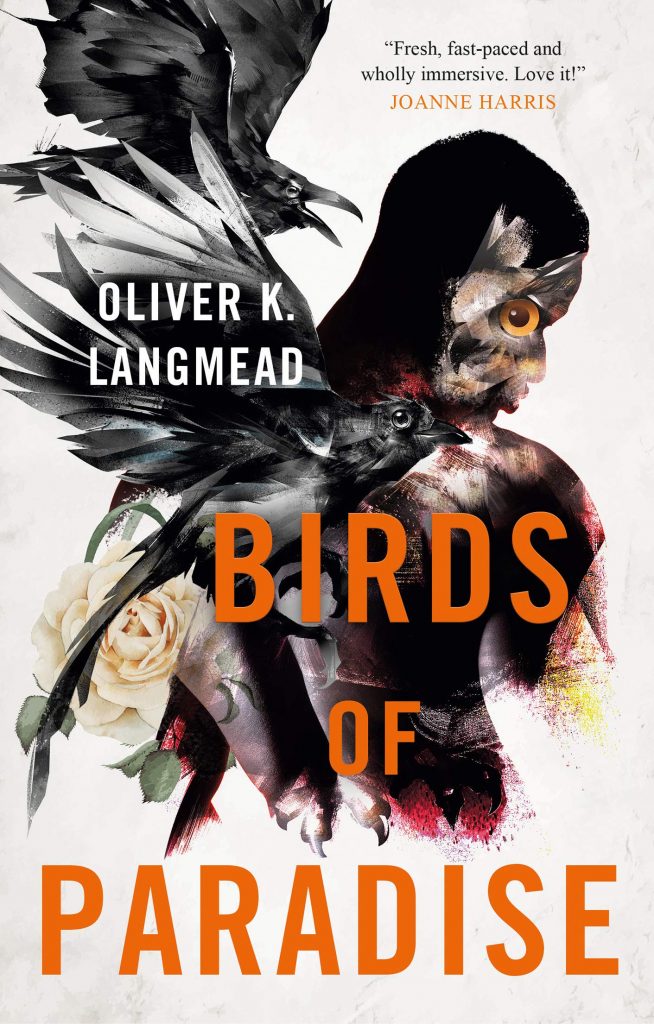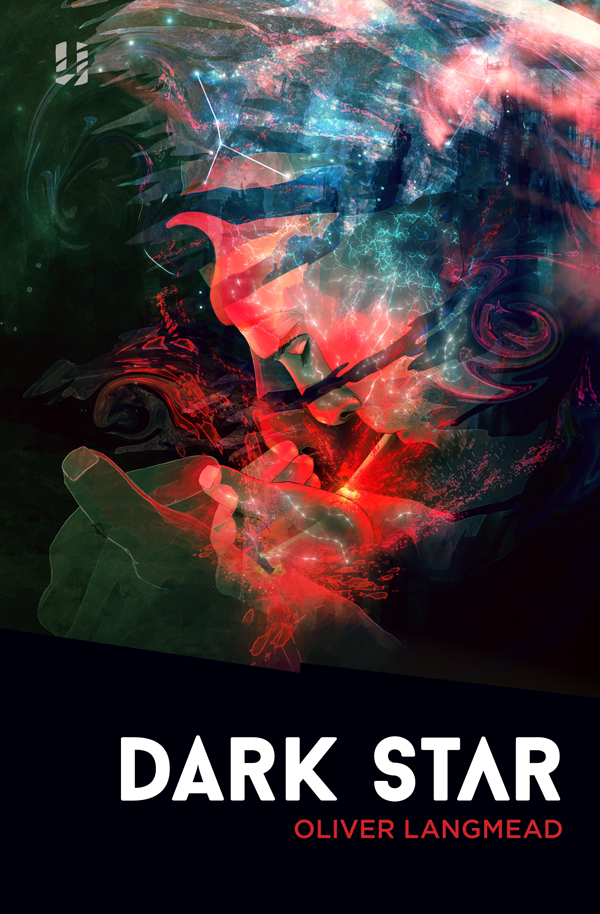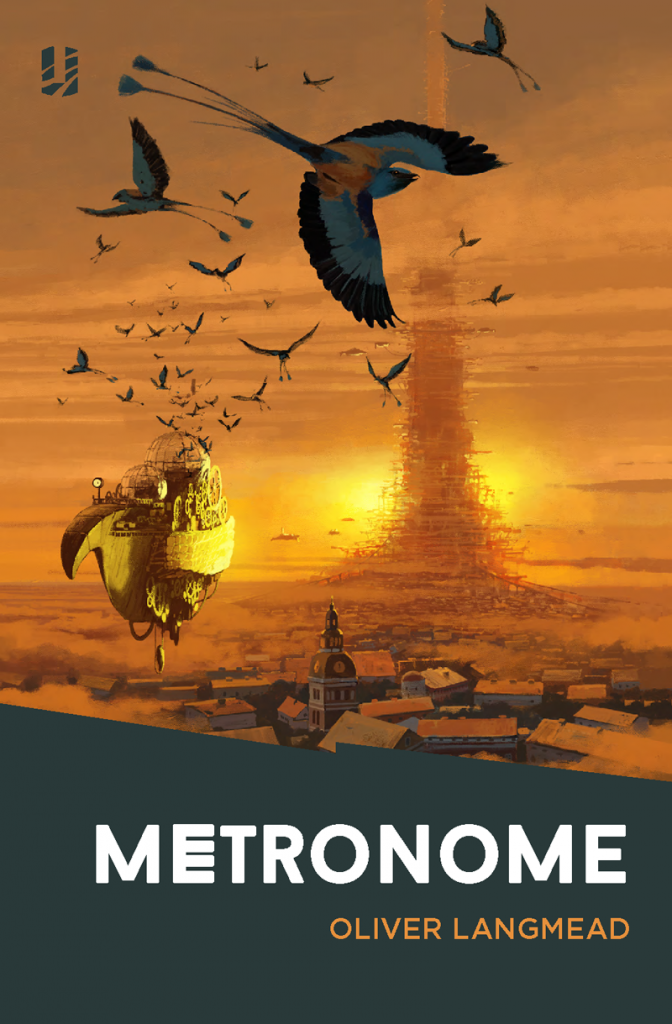‘Hope and beauty against all the odds’: An Interview with Oliver K. Langmead
Face to face conversation has been a rarity this past year, and sadly my time spent getting to know author and poet Oliver K. Langmead was no exception. He agrees, ‘I feel as if I’m spending half my life in Zoom meetings, or typing away in a Word document – staring at the same screen for everything.’ Despite our digital medium, I have come away from this experience with a very friendly and personable impression of Oliver through our many emails back and forth discussing his new book Birds of Paradise, which comes out this month, and much more.
Of course, the first topic we discussed was how we were coping with these weird times we find ourselves in, which for Oliver has been an exercise in patience. ‘An exercise in learning to sit still and find new ways of working and socialising. I’ve been coping in the best way I know how – by keeping busy!’ Keeping busy for Oliver means writing lengthier pieces and developing habits and rituals that work for him. The significant downside he tells me is the limited workspace, something I think we have all felt this past year with the closure of cafés and offices. Despite this he has continued to write and appears very excited for his future projects.
Oliver is an author and poet based in Glasgow, currently completing a PhD in terraforming and ecological philosophy at the University of Glasgow. His skill with language has already received praise with his long form poem Dark Star, which was included in The Guardian’s Best Books of 2015. This is not surprising since he began writing at a young age, with literature always playing a big part in his life.
I was brought up on the finest of fantasies – Tolkien, and Philip Pullman, and Terry Pratchett – and started emulating them as soon as I could. I have a vivid memory of using a word processor for the first time. The laptop was the first my family had ever owned, and was pre-Windows – capable of little more than letting the user write documents on its green-tinted screen. I was so proud to write a Redwall inspired paragraph on it, marvelling at the way the words emerged from the printer looking so formal, as if I were published like Brian Jacques.
Admittedly his writing has developed greatly over time, but these creative influences are still evident in his writing style and engagement with fantasy conventions. Reading his latest novel Birds of Paradise I was reminded of Neil Gaiman’s work. Oliver admits he is a big fan of Gaiman’s American Gods, owning multiple copies himself.
I keep a shelf of my favourite books beside me (the fanciest editions I’ve been able to find), to remind me of what good writing is whenever I feel bad about my own. There’s Neil Gaiman, of course, but Pratchett, and Pullman, and Jacques too, along with Ali Smith, China Mieville, Susanna Clarke, Michel Faber, Brian Catling, Shirley Jackson, Jeff Vandermeer and Raymond Chandler. And those are just the books I keep next to me. I am lucky to have read such a broad selection of authors in my life so far, and to be influenced by those I would call my friends.
These inspirations have certainly shone through – his work has received wide praise and been likened to many of the above authors. For Oliver, his biggest achievement so far has been Birds of Paradise. He began writing it in 2009, and since then it has gone through many drafts and edits, adding up to over a decade of work. ‘During those years, there were plenty of times I thought I’d never finish it. But I eventually did, and the result is something I’m immensely proud of.’
And for considerable reason, Birds of Paradise is a restless and bristling adventure which keeps you guessing throughout. Drawing on the biblical stories of Eden and the fall of man, the narrative follows Adam and a menagerie of animal characters as they embark on an action fueled journey to uncover the lost pieces of Eden. While reading I was interested in what compelled Oliver to draw on stories from The Bible.
Looking back on my work, I do see something of a trend of religious themes (especially Christian mythology), which is interesting because I’m not at all religious. I am fascinated by religion, though, and the stories that people choose to believe (or have, in the past, chosen to believe) are fact. It begs the question – what if some of those stories (Eden, and the fall, in this casse) really were real? And what would it be like if some of those characters were still alive today?
This topic is explored throughout the course of the novel, and the act of storytelling itself is ruminated on as well. In the beginning, we are introduced to Adam as he contemplates the visuality of words and the processes of storytelling:
He’s always been a great admirer of literature, but he still struggles to get his head around moving pictures. The problem, he thinks, is that he’s too used to the ambiguity of naked words – the way that he’s allowed to be the director of the story when he’s reading it. [1]
Discussing this quote during our conversation, I was interested in finding out whether Adam’s views on literature and film reflected Oliver’s own. He told me they are very different, and that Adam’s comments are more a reflection on the length of time he has been around, and all the various transformations culture has undergone during his lifetime. ‘He’s still getting used to cinema after being so used to the written word as a primary means of creative narrative entertainment for so long. That being said – I am, I think, a very visual creative. I really need to be able to direct and picture a scene in my head before I can write it down.’
This interest in various art forms plays an important role in his work. In Metronome, music is an integral part of the narrative. The novel includes musical maps and a protagonist who is a musician, not unlike Oliver who is musical himself and tours as part of a band. He believes this experience has made its way into the text, imbuing it with an inherent musicality. This interplay between various art forms is something that appeals to him as a writer.
Translations between forms has always fascinated me. The most obvious one is filmed adaptations of books, which are always something of a mixed bag. It’s not something I have a terrific amount of experience with, though – beyond the adaptations of my work into audiobooks. I am lucky enough to have had three amazing actors work on those, and the work, each time, has felt unexpected and compelling. Even using my exact words, the interpretations of them have been so different to hear.
Much of Oliver’s work so far falls into the genre of fantasy; Dark Star is a science fiction noir, Metronome is a portal quest and Birds of Paradise is an intrusive fantasy. He tells me he is currently working on a dystopia and a science fiction epic and enjoys playing around with conventions of genre in his writing. ‘Much like China Mieville, I don’t like to stick around in one genre for very long. But fantasy will always hold a special place in my heart ̶ there’s something nice about being able to write anything you can imagine.’
Oliver’s body of work certainly is imaginative, each text crafting vivid worlds and the characters who occupy them. Perhaps unlike many fantasy authors, Oliver also writes poetry, but he doesn’t favour one form above the other.
I like both! For different reasons, though. Writing in verse, to me, feels like solving a puzzle – it’s so satisfying to construct each perfect line – while writing in prose is like painting on an endless canvas. It’s nice to be able to do both, because it lets me take a break from one form when I’m frustrated with it, and work on the other.
Often his work blurs the lines between these forms, as with Dark Star which was written in verse but intended to be read like a book. ‘A page-turner poem, if you like.’
One of the reasons Oliver’s work is so compelling is due to his characters, who are all complex and often flawed, which was an aspect we discussed further. He tells me they are the most interesting characters to read and write about. In Dark Star Virgil is an addict and in Birds of Paradise Adams suffers from complex trauma, but these characters’ suffering is never the main focus. ‘The glimmers of brightness in their lives, and the ways they find happiness in their (sometimes literally) dark worlds. I like to write about hope and beauty against all the odds.’ Themes of hope and beauty certainly do shine through his work, offering a counter to the rather heavier issues often discussed.
One such topic is the environment, with environmental issues seeming to be an important theme both in his writing and PhD research. Crossovers between these two are influencing much of his writing at the moment. ‘I am currently in the closing stages of completing a doctorate in Creative Writing, a large part of which involves what’s called “practice as research”. The creative work I’m currently producing is intimately bound up in my research into environmental issues and philosophies – finding creative ways to think through the Anthropocene.’ On whether he thinks literature can play a role in our current social debate around climate change, Oliver remarked, ‘More often than not, literature does not offer solutions to climate catastrophe. But it can offer innovate ways to think through the more difficult-to-grasp elements of climate catastrophe.’
Oliver tells me with much relief that his doctorate research is coming to an end, ‘I would not recommend doing a doctorate and writing a couple of other novels at the same time – juggling my schedule to pull it off has been an experience that I wouldn’t like to replicate again.’ Despite the stress, he admits it has been a rewarding experience. As a previous student at the University of Glasgow myself, I was interested to know how he found studying there. ‘I love being at Glasgow (and Dundee before it) because it offers such a rich range of experts, all of whom possess such passion for their work that it’s always inspiring. It helps that the West End of Glasgow is just a beautiful place to be, as well.’
Rounding off our conversation we discussed his current writing and what to expect from him looking ahead. It appears Oliver’s next book will be wildly different to Birds of Paradise:
My next book, which will be coming out in 2022, is called Glitterati – which is about fashion, family, and the feckless billionaire class. If Birds of Paradise was (in part) a way for me to express how I’ve been feeling about climate change, then Glitterati is about how I’ve been feeling about capitalism. It’s also fabulous, and outrageous, and stems from my love of drag culture.
These shifts in preoccupations should make for an interesting comparison to his earlier work, and I know as a fan of drag culture myself I am looking forward to this release. As well as Glitterati, Oliver tells me he has just finished a long-form poem called Calypso. Drawing on his research, this poem addresses the topic of terraforming, and his agent has commented it’s like Adrian Tchaikovsky by way of Jeff Vandermeer, a comment Oliver found flattering. It becomes clear during the course of our conversation that Oliver’s interests are broad, therefore pigeonholing him as a writer of fantasy may be too restrictive. The breadth of influences from authors to popular culture infuses his body of work with a richness of culture and variety, making him an exciting voice in contemporary Scottish literature.
As an alumnus of the University of Dundee himself, I finished off by asking Oliver if he had any advice for current students interested in pursuing a career as a writer themselves, to which his first response was ‘far too much!’ He went on:
I suppose if I had only had one thing to say, it would be to have patience and don’t give up. No two writing careers are the same. The Writing Practice and Study MLitt at Dundee is a fantastic starting point, but it is only the beginning. Keep working, and keep developing your practice, and you will, I guarantee, eventually find the right place for your work.
His attitude towards work has certainly motivated me with my own studies, showing current students at Dundee like myself just what is possible if you keep going. Perseverance seems to be the prevailing characteristic required, something Oliver has shown he has in abundance. Juggling a doctorate with writing novels and poems all during the pandemic was clearly a challenge, but he has achieved it all and has no plans to slow up.
As I finish typing our interview up, I am left with a fond impression of Oliver. His passion for literature is obvious from the outset, but more than that he is talkative and full of knowledge on a wide range of subjects from environmental issues to drag culture. Self-assured yet not hindered by any pretentiousness, he is a hard-working writer who shows a genuine love for his craft. For fans of fantasy or realism, novels or poetry, there is something for everyone in Oliver’s writing and I believe this diversity and desire to play with formal conventions make him an exciting young writer to watch. I know I am looking forward to seeing where his career takes him.
Jessica Stevenson
Notes:
[1] Oliver K. Langmead, Birds of Paradise (London: Titan Books, 2021)




Leave a Reply